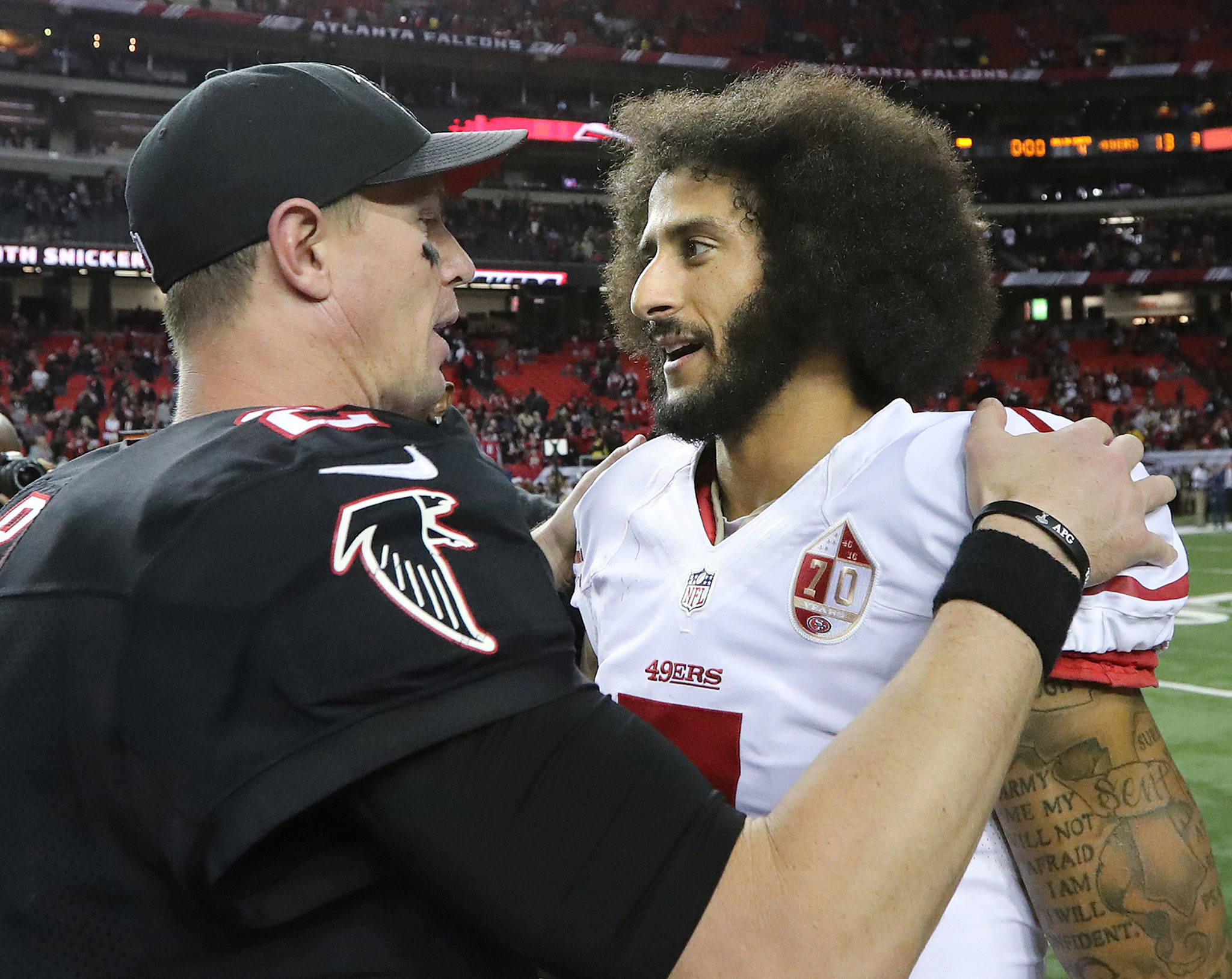Hailed by some and vilified by others for his failure to stand for the national anthem last fall, former San Francisco 49ers quarterback Colin Kaepernick has been the subject of numerous commentaries during the past year.
Few have compared Kaepernick to his socio-political opposite, former Heisman Trophy winner Tim Tebow. Yet the two have more in common than might be imagined.
Both are/were (Tebow’s football career presumably can be described in the past tense) quarterbacks better known for running than passing. Fairly or not, both are seen as divisive forces.
And both are currently looking for a job in the National Football League— in part because even sympathetic potential employers view them as a distraction.
Unable to read the minds of others, I can’t determine whether Kaepernick is being blackballed by NFL owners for his political views. Certainly every day that passes without the free agent quarterback receiving an offer from the likes of the New York Jets and Los Angeles Rams adds fuel to that fire.
What I do know about football coaches and executives at every level is that the vast majority detest off-the-field distractions. All things being equal, they are going to choose the option that presents the least hassle.
Even acknowledging his well-documented struggles with passing accuracy, Tebow probably is at least as valuable as half the backup quarterbacks in the NFL — particularly for a team willing to tailor its offense around his particular skill set.
But when the powers-that-be factored in the baggage that comes with signing Tebow (the media attention, the possibility of him alienating teammates with his outspoken Christian beliefs), the prevailing viewpoint seemed to have been that he wasn’t worth the trouble. Tebow is currently dividing time between television commentary and a career in minor league baseball.
Kaepernick’s situation is admittedly different. Ranked among the game’s elite quarterbacks only a few years ago, he could be classified as a starter-in-waiting for any team that signs him.
That’s why the Kaepernick’s brief flirtation with the Seattle Seahawks was doomed to end without a deal.
Most of the reasons speculated for the Seahawks’ failure to sign Kaepernick — his salary demands, a potential backlash from the Seattle fan base, possible opposition from starting quarterback Russell Wilson — seem like red herrings.
In Wilson, the Hawks already have a firmly entrenched and remarkably durable starting quarterback. In the event of a long-term injury to Wilson, Kaepernick would be a better alternative than current reserves Trevone Boykin and Austin Davis. But if the Seattle back-up QB takes the field only in the event of emergencies or blowouts, Boykin or Davis can handle that role just as well without the accompanying controversy.
As the Seahawk back-up, Kaepernick would be subjected to constant scrutiny — and constant questions about his job status. It’s unlikely that Seahawk fans will chant “We want Davis,” any time Wilson throws an interception. That might not have been the case with Kaepernick on the bench.
Call me naive, but I believe the Seahawks passing on Kaepernick was a football-related decision.
Kaepernick deserves a job somewhere in the NFL. He might have been a good fit for politically liberal Seattle. He wouldn’t have been such a great fit for the Seahawks.
Drop the Puck
Speaking of politics, developments in Seattle last week indicated that city officials favor a remodeled KeyArena over Chris Hansen’s projected Sodo facility as a future site for professional basketball and hockey.
It also appears that a hockey franchise will probably come first.
My reactions are, in order, “Not surprising” and “Great.”
Taking the second part first, there are a lot of reasons why hockey would be more warmly embraced than the NBA in Seattle.
For hockey fans, there are no lingering scars over past betrayals, as is the case over the Sonics’ defection to Oklahoma City. A National Hockey League expansion team can become competitive faster than an NBA counterpart. It might be just me, but hockey is arguably the more exciting sport, at least at the pro level.
More to the point, an NHL expansion franchise is essentially Seattle’s for the taking.
When the NHL took expansion bids two years ago, only Las Vegas and Quebec City met the requirements. Given NHL Commissioner Gary Bettman curious preferences for Sun Belt locations over cities in hockey-mad Canada, it wasn’t surprising that only Las Vegas was granted a franchise.
That leaves one expansion slot open. If Seattle passes, Bettman might end up assessing hockey interest in New Orleans or Honolulu – if not Mexico City — in order to avoid Canada.
As for the arena location, Hansen had too many strikes against him (in the form of political opposition and slanted coverage by some media outlets) to make the Sodo site a strong likelihood.
There is zero evidence that building another sports facility in the area would cripple the Seattle maritime industry. Still, given the traffic snarls that develop each time the Mariners and Sounders, for example, play on the same day, there might be better venues than Sodo.
In hindsight, Hansen probably should have scrapped a Seattle site early in the process and bought property in Renton or Tukwila — cities that probably would have embraced his project.
Considering the lack of parking and even greater traffic congestion around KeyArena, don’t be surprised if Seattle government officials eventually take a “none of the above” stance on an arena project.
In politics, doing nothing is always a viable option.
Rick Anderson: (360) 537-3924; randerson@thedailyworld.com



